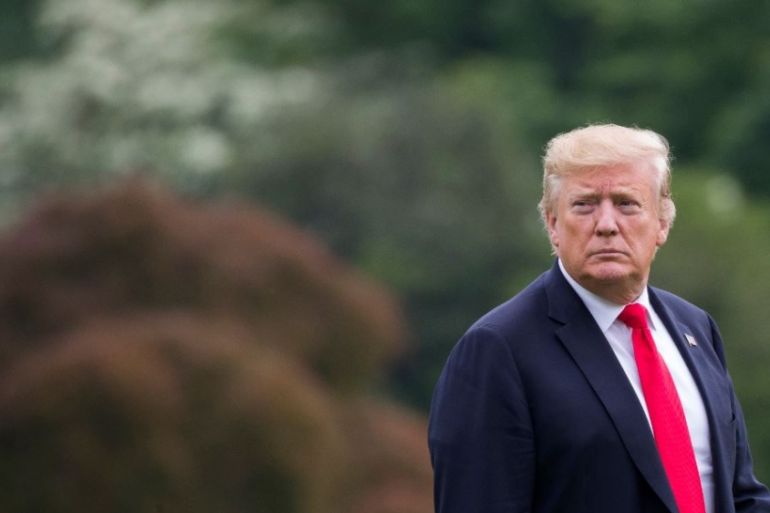Trump renews Mexico tariff threat amid row over migration deal
Days after Trump announced a deal with Mexico, the two countries appear unable to agree on exactly what’s in it.

Mexico and the United States might consider additional steps next month to restrict irregular immigration from Central America, Mexico‘s foreign minister said on Monday as the US president renewed his threat to impose tariffs if certain aspects of a deal reached last week were not implemented.
Mexican Foreign Minister Marcelo Ebrard said the measures could be needed if last week’s deal between Washington and Mexico fails to reduce within 45 days the numbers of migrants entering Mexico, mainly from Central America, on their way to the US-Mexico border.
Keep reading
list of 4 itemsFull jury panel seated on third day of Trump’s New York hush-money trial
Seven jurors seated on the second day of Trump’s New York hush-money trial
Six takeaways from first day of Trump’s New York hush money criminal trial
The deal averted import tariffs on all Mexican goods that President Donald Trump had threatened to impose unless Mexico committed to do more to fight irregular immigration into the US.
Under the agreement, Mexico will rapidly expand a programme under which migrants applying for asylum in the US wait out the process in Mexico. It has also pledged to reinforce its southern border with Guatemala with 6,000 members of its National Guard militarised police force.
But Trump said on Monday he would go ahead with the proposed tariffs if Mexico’s Congress did not back part of the deal that may need politicians’ approval.
“We have fully signed and documented another very important part of the Immigration and Security deal with Mexico, one that the US has been asking about getting for many years. It will be revealed in the not too distant future and will need a vote by Mexico’s Legislative body!..” Trump tweeted.
“We do not anticipate a problem with the vote but, if for any reason the approval is not forthcoming, tariffs will be reinstated,” he added, without elaborating.
Brazil, Panama, Guatemala
But Ebrard, holding up a paper and pointing to the previously announced details, said, “There is no other thing beyond what I have just explained.”
The episode revealed the complicated political dynamics at play as Trump and Mexican President Andres Manuel Lopez Obrador tussle over who made out best in the agreement hashed out under Trump’s threat of new tariffs on Mexico.
Ebrard told a news conference on Monday that Trump was referring to possible further measures to pressure countries other than the US to share the burden.
“If the measures we are proposing are not successful, we have to discuss with the United States and with other countries, like Guatemala, Panama and Brazil,” he said.
“It is a regional system,” he added. “If we have to participate in a regional model like the one I have just described, we would have to present that to Congress.”
Many of the migrants and refugees are families trying to escape poverty and violent crime in Central America, one of the most impoverished areas in the Western Hemisphere.
Asylum seekers from El Salvador and Honduras first pass through Guatemala when fleeing their homes, while Cubans and Haitians often fly first to Panama before heading to the US through Mexico. Migrants from African countries regularly fly to Brazil before making the arduous journey north.
While he did not go into detail, Ebrard suggested that asylum seekers might have to seek refuge in the first country they reached after leaving their homeland.
That is different from a long-standing US demand that Mexico be declared a safe place for asylum seekers, requiring them to seek refuge in Mexico if they passed through the country on the way to the US. That demand was put on the table again by US negotiators last week, but was not accepted by Mexico.
Later on Monday, however, Ebrard also said that Mexico would begin talks about a possible “safe third country” agreement if migration at Mexico’s southern border did not decrease within the 45 days.
“We would start conversations about what they would like, which is for Mexico to become a safe third country,” Ebrard said on a Mexican radio programme.
Any plan that called on Brazil, Guatemala or Panama to take in more asylum seekers would require cooperation from those countries. Officials from those countries did not immediately respond to Ebrard’s comments.
US border officers apprehended more than 132,000 people crossing from Mexico in May, the highest monthly level since 2006.
Cuccinelli named acting head of USCIS
Meanwhile on Monday, the Trump administration that Kenneth Cuccinelli would serve as the new acting director of US Citizenship and Immigration Services (USCIS). Cuccinelli, a former attorney general of Virginia, has developed a reputation as a hardliner on immigration.
He has called for denying citizenship to US-born children whose parents are without documents, and authorised law enforcement officials to investigate the immigration status of anyone they stopped.
Mexico had no specific target for the reduction of migrant numbers, Ebrard said. Still, Martha Barcena, Mexico’s ambassador to Washington, told CBS News on the weekend there had been discussion of reducing the numbers to levels around those of 2018.
Ebrard also said there was no agreement between the US and Mexico to buy more agricultural products under the accord, despite Trump saying over the weekend that Mexico had agreed to buy “large quantities” from US farmers.
Ebrard said he thought Trump might be making a calculation based on Mexican agricultural imports when freed from the threat of tariffs.